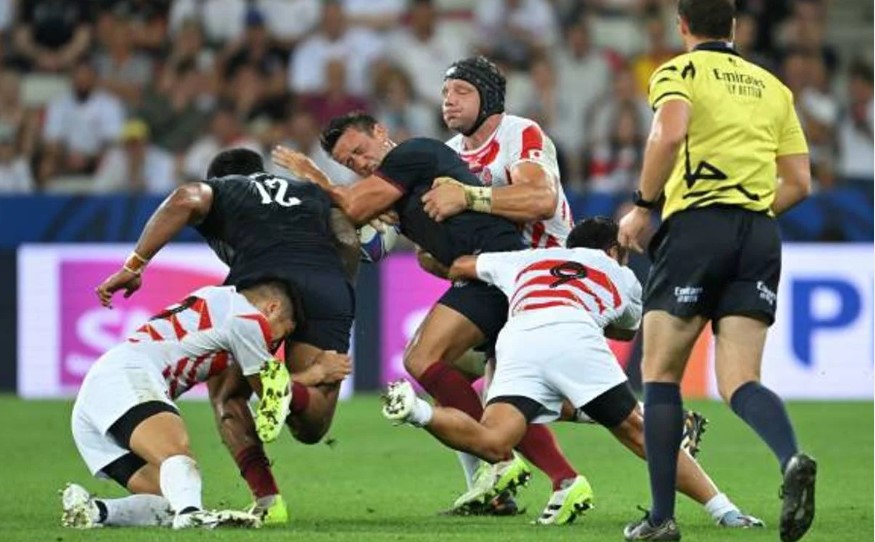Despite Japan’s claims of understanding England’s long-standing playing style, the Brave Blossoms found themselves unable to contend with it during Sunday’s Rugby World Cup Pool D clash. Assistant coaches Tony Brown and Shin Hasegawa had confidently asserted that “England have been playing the same style for 100 years.” However, their words did little to prepare Japan for the challenge that awaited them at Stade de Nice on a hot and muggy evening.
On Monday morning, shortly after returning to their hotel in Monaco, Japan’s defense coach John Mitchell expressed his sentiments regarding the match. He commented, “You witnessed a team that gave it everything and did not get the reward they wanted.” Despite their best efforts, Japan faced a 34-12 defeat, highlighting the gap between their expectations and the outcome of the game.
Pointing out that Japan had opportunities of their own, the former All Black acknowledged that England managed to capitalize on their territorial advantage, while Japan missed out on a few chances. These fine margins, he emphasized, are typical at this level of rugby and in such a tournament.
England asserted dominance in terms of possession with 66 percent compared to Japan’s 34 percent, and they relentlessly employed a kicking strategy, resulting in a territorial advantage of 61 percent to 39 percent. While this approach lacked imagination and even drew boos from their own fans, it proved to be effective.
In a foreshadowing of events to come, Semisi Masirewa’s failure to secure a kick ahead in the third minute led to a knock-on behind his own try line, ultimately allowing England to take the lead with a penalty from the man-of-the-match, George Ford.
Reflecting on the game, Ford admitted, “It probably wasn’t the most attractive match to watch. Playing with the ball in those conditions can be challenging, especially with the late kick-offs and the greasy ball. However, we managed to find ways to break down the opposition and secure the victory.”
While Ford and his England teammates lauded their opponents for their resilience, particularly emphasizing Japan’s determination reflected in their nickname, the Brave Blossoms, it must be acknowledged that Jamie Joseph’s team often proved to be their own greatest obstacle.
Prop Keita Inagaki pointed out, “We made crucial mistakes when we had prime opportunities to score. Despite securing points through kicks, we struggled to convert them into tries. Our inability to secure our own ball during line-outs hindered us from executing our planned strategies effectively.”
In stark contrast, England executed their game plan precisely as intended. Despite moments when Kotaro Matsushima and Jone Naikabula successfully handled England’s high kicks, Japan’s inability to recycle the ball swiftly prevented them from launching counter-attacks.
As the game drew to a close, Matsushima, Dylan Riley, and Lomano Lava Lemeki showcased glimpses of what could have been potential game-changers. However, Japan’s support play lagged behind, and the isolated line-breaker dashed any remaining hopes of securing a try.
Mitchell expressed his regret, emphasizing the significance of executing these critical moments at this level of competition.
On the defensive front, Pieter “Lappies” Labuschagne led with 19 successful tackles, closely followed by Michael Leitch with just one less. Jack Cornelsen continued to contribute tirelessly, often in less noticed roles such as disrupting the English line-out and working hard at the breakdown.
Inagaki remained optimistic, stating, “While we suffered a loss today, our journey is not over. It’s vital to prepare thoroughly for our upcoming match against Samoa on September 28 in Toulouse.”
A victory against the Pacific islanders could potentially set the stage for a decisive showdown with Argentina on October 8 in Nantes. Mitchell emphasized the importance of reminding the players that there is still plenty at stake.
(Source: Rich Freeman | Kyodo News | David McElhinney | Japan Times)









